Case Study 3: Ethical Dilemma of Forging Signatures in Nursing
VerifiedAdded on 2021/05/31
|10
|2651
|28
Case Study
AI Summary
This case study delves into a scenario where a nurse is asked by a friend to forge their signature on a class attendance list. The analysis begins with an immediate refusal and a subsequent explanation rooted in ethical principles. The study then applies the Code of Ethics for Nurses in Australia, focusing on the value of informed decision-making across self, person, colleagues, and community. It emphasizes the nurse's responsibility to make ethical decisions based on accurate information and uphold professional standards. Furthermore, the case study examines the Code of Professional Conduct for Nurses in Australia, highlighting conduct statements regarding professional standards, adherence to laws, support for informed decision-making, and reflective ethical practice. The potential legal and future implications of such actions are discussed, including the development of unethical behavior, poor academic performance, and the erosion of professional integrity. The conclusion reinforces the importance of ethical conduct and making informed decisions in the nursing profession.
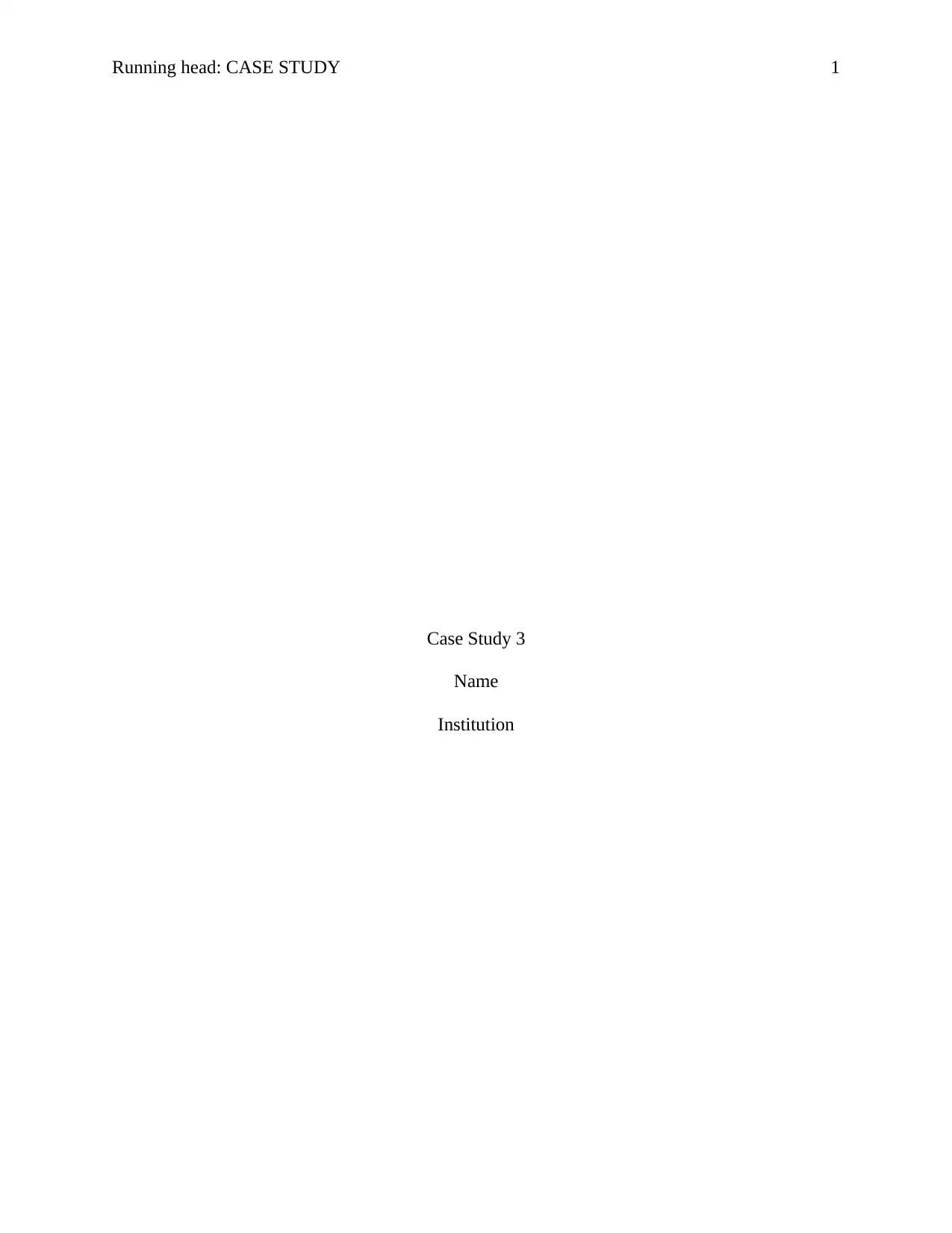
Running head: CASE STUDY 1
Case Study 3
Name
Institution
Case Study 3
Name
Institution
Paraphrase This Document
Need a fresh take? Get an instant paraphrase of this document with our AI Paraphraser
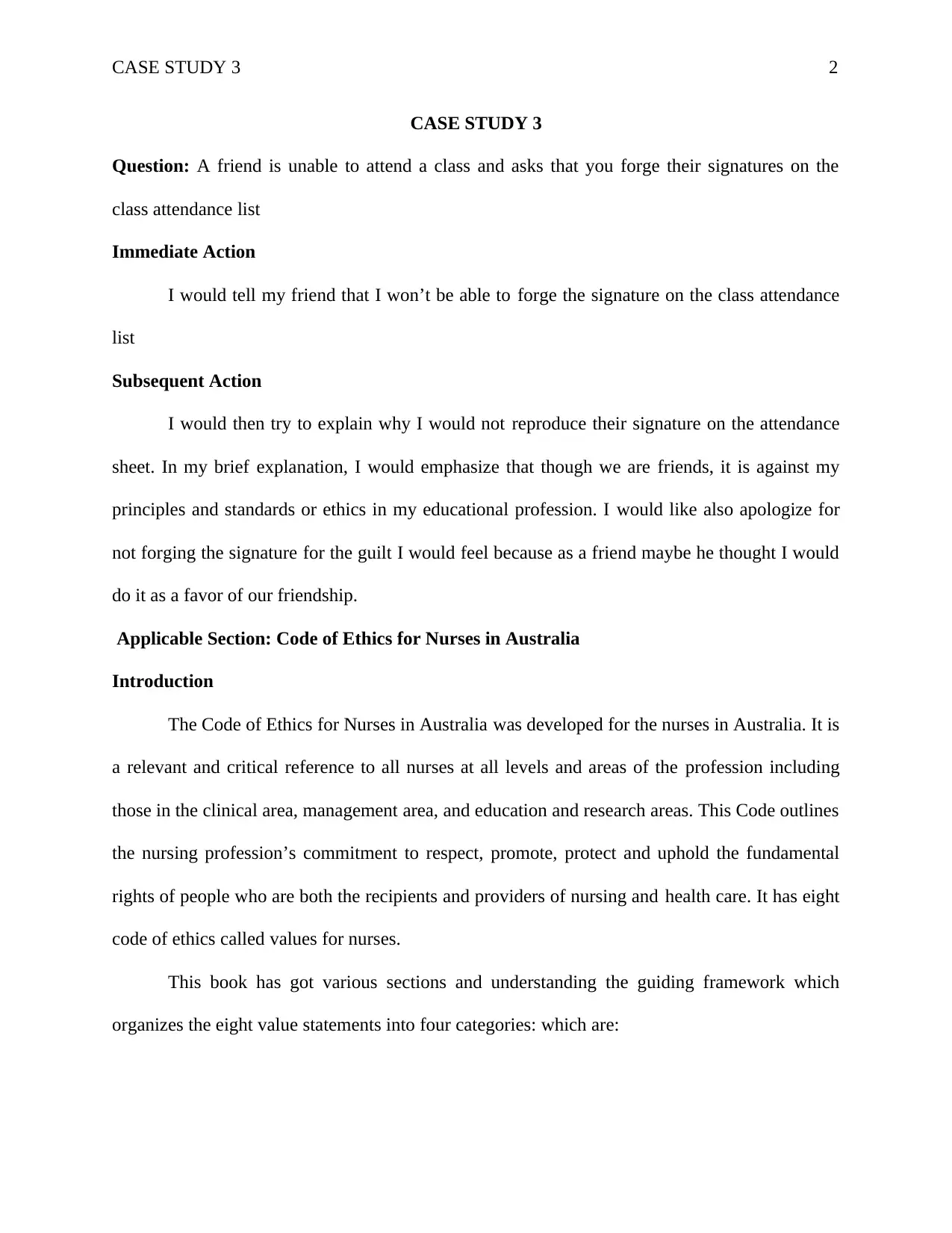
CASE STUDY 3 2
CASE STUDY 3
Question: A friend is unable to attend a class and asks that you forge their signatures on the
class attendance list
Immediate Action
I would tell my friend that I won’t be able to forge the signature on the class attendance
list
Subsequent Action
I would then try to explain why I would not reproduce their signature on the attendance
sheet. In my brief explanation, I would emphasize that though we are friends, it is against my
principles and standards or ethics in my educational profession. I would like also apologize for
not forging the signature for the guilt I would feel because as a friend maybe he thought I would
do it as a favor of our friendship.
Applicable Section: Code of Ethics for Nurses in Australia
Introduction
The Code of Ethics for Nurses in Australia was developed for the nurses in Australia. It is
a relevant and critical reference to all nurses at all levels and areas of the profession including
those in the clinical area, management area, and education and research areas. This Code outlines
the nursing profession’s commitment to respect, promote, protect and uphold the fundamental
rights of people who are both the recipients and providers of nursing and health care. It has eight
code of ethics called values for nurses.
This book has got various sections and understanding the guiding framework which
organizes the eight value statements into four categories: which are:
CASE STUDY 3
Question: A friend is unable to attend a class and asks that you forge their signatures on the
class attendance list
Immediate Action
I would tell my friend that I won’t be able to forge the signature on the class attendance
list
Subsequent Action
I would then try to explain why I would not reproduce their signature on the attendance
sheet. In my brief explanation, I would emphasize that though we are friends, it is against my
principles and standards or ethics in my educational profession. I would like also apologize for
not forging the signature for the guilt I would feel because as a friend maybe he thought I would
do it as a favor of our friendship.
Applicable Section: Code of Ethics for Nurses in Australia
Introduction
The Code of Ethics for Nurses in Australia was developed for the nurses in Australia. It is
a relevant and critical reference to all nurses at all levels and areas of the profession including
those in the clinical area, management area, and education and research areas. This Code outlines
the nursing profession’s commitment to respect, promote, protect and uphold the fundamental
rights of people who are both the recipients and providers of nursing and health care. It has eight
code of ethics called values for nurses.
This book has got various sections and understanding the guiding framework which
organizes the eight value statements into four categories: which are:
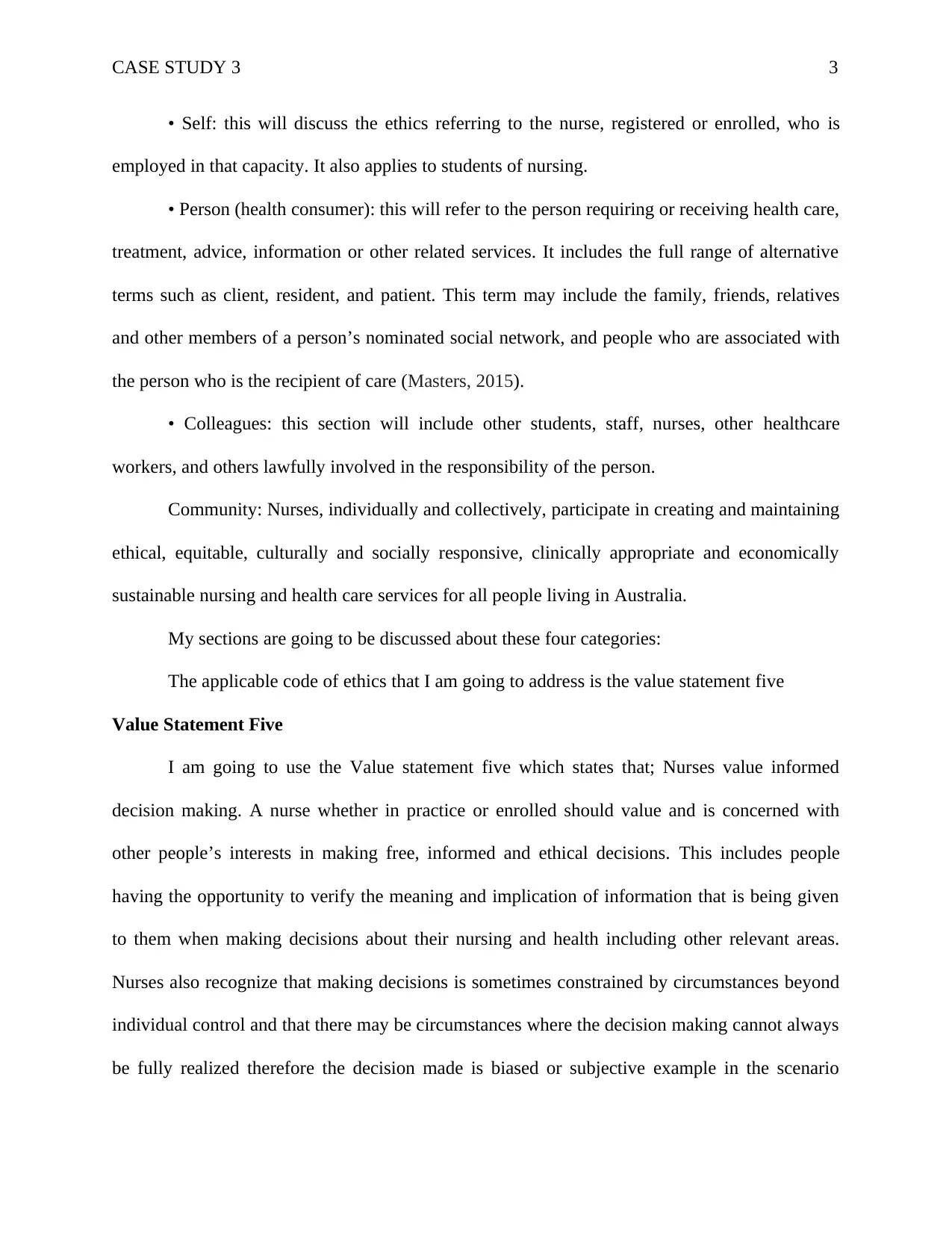
CASE STUDY 3 3
• Self: this will discuss the ethics referring to the nurse, registered or enrolled, who is
employed in that capacity. It also applies to students of nursing.
• Person (health consumer): this will refer to the person requiring or receiving health care,
treatment, advice, information or other related services. It includes the full range of alternative
terms such as client, resident, and patient. This term may include the family, friends, relatives
and other members of a person’s nominated social network, and people who are associated with
the person who is the recipient of care (Masters, 2015).
• Colleagues: this section will include other students, staff, nurses, other healthcare
workers, and others lawfully involved in the responsibility of the person.
Community: Nurses, individually and collectively, participate in creating and maintaining
ethical, equitable, culturally and socially responsive, clinically appropriate and economically
sustainable nursing and health care services for all people living in Australia.
My sections are going to be discussed about these four categories:
The applicable code of ethics that I am going to address is the value statement five
Value Statement Five
I am going to use the Value statement five which states that; Nurses value informed
decision making. A nurse whether in practice or enrolled should value and is concerned with
other people’s interests in making free, informed and ethical decisions. This includes people
having the opportunity to verify the meaning and implication of information that is being given
to them when making decisions about their nursing and health including other relevant areas.
Nurses also recognize that making decisions is sometimes constrained by circumstances beyond
individual control and that there may be circumstances where the decision making cannot always
be fully realized therefore the decision made is biased or subjective example in the scenario
• Self: this will discuss the ethics referring to the nurse, registered or enrolled, who is
employed in that capacity. It also applies to students of nursing.
• Person (health consumer): this will refer to the person requiring or receiving health care,
treatment, advice, information or other related services. It includes the full range of alternative
terms such as client, resident, and patient. This term may include the family, friends, relatives
and other members of a person’s nominated social network, and people who are associated with
the person who is the recipient of care (Masters, 2015).
• Colleagues: this section will include other students, staff, nurses, other healthcare
workers, and others lawfully involved in the responsibility of the person.
Community: Nurses, individually and collectively, participate in creating and maintaining
ethical, equitable, culturally and socially responsive, clinically appropriate and economically
sustainable nursing and health care services for all people living in Australia.
My sections are going to be discussed about these four categories:
The applicable code of ethics that I am going to address is the value statement five
Value Statement Five
I am going to use the Value statement five which states that; Nurses value informed
decision making. A nurse whether in practice or enrolled should value and is concerned with
other people’s interests in making free, informed and ethical decisions. This includes people
having the opportunity to verify the meaning and implication of information that is being given
to them when making decisions about their nursing and health including other relevant areas.
Nurses also recognize that making decisions is sometimes constrained by circumstances beyond
individual control and that there may be circumstances where the decision making cannot always
be fully realized therefore the decision made is biased or subjective example in the scenario
⊘ This is a preview!⊘
Do you want full access?
Subscribe today to unlock all pages.

Trusted by 1+ million students worldwide
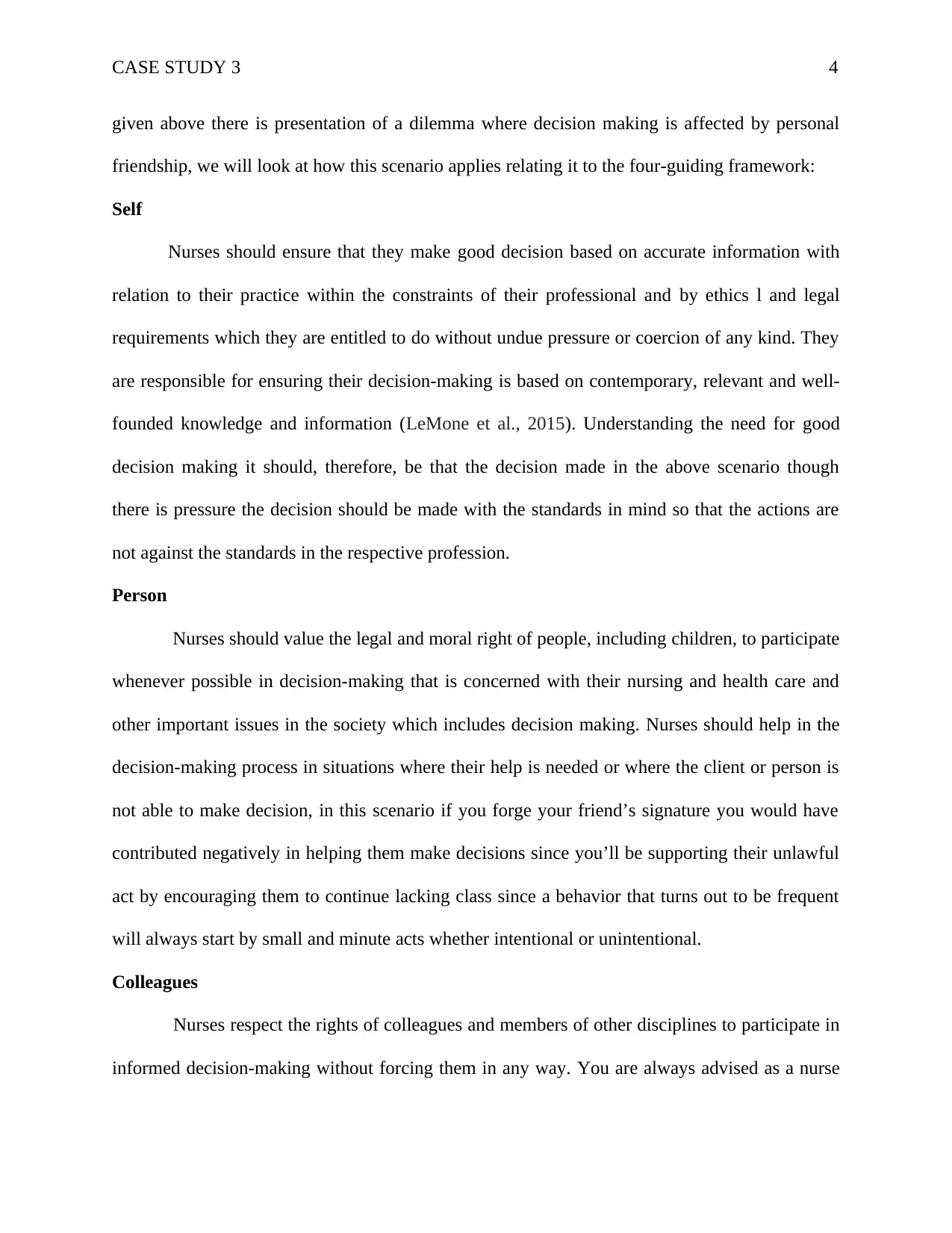
CASE STUDY 3 4
given above there is presentation of a dilemma where decision making is affected by personal
friendship, we will look at how this scenario applies relating it to the four-guiding framework:
Self
Nurses should ensure that they make good decision based on accurate information with
relation to their practice within the constraints of their professional and by ethics l and legal
requirements which they are entitled to do without undue pressure or coercion of any kind. They
are responsible for ensuring their decision-making is based on contemporary, relevant and well-
founded knowledge and information (LeMone et al., 2015). Understanding the need for good
decision making it should, therefore, be that the decision made in the above scenario though
there is pressure the decision should be made with the standards in mind so that the actions are
not against the standards in the respective profession.
Person
Nurses should value the legal and moral right of people, including children, to participate
whenever possible in decision-making that is concerned with their nursing and health care and
other important issues in the society which includes decision making. Nurses should help in the
decision-making process in situations where their help is needed or where the client or person is
not able to make decision, in this scenario if you forge your friend’s signature you would have
contributed negatively in helping them make decisions since you’ll be supporting their unlawful
act by encouraging them to continue lacking class since a behavior that turns out to be frequent
will always start by small and minute acts whether intentional or unintentional.
Colleagues
Nurses respect the rights of colleagues and members of other disciplines to participate in
informed decision-making without forcing them in any way. You are always advised as a nurse
given above there is presentation of a dilemma where decision making is affected by personal
friendship, we will look at how this scenario applies relating it to the four-guiding framework:
Self
Nurses should ensure that they make good decision based on accurate information with
relation to their practice within the constraints of their professional and by ethics l and legal
requirements which they are entitled to do without undue pressure or coercion of any kind. They
are responsible for ensuring their decision-making is based on contemporary, relevant and well-
founded knowledge and information (LeMone et al., 2015). Understanding the need for good
decision making it should, therefore, be that the decision made in the above scenario though
there is pressure the decision should be made with the standards in mind so that the actions are
not against the standards in the respective profession.
Person
Nurses should value the legal and moral right of people, including children, to participate
whenever possible in decision-making that is concerned with their nursing and health care and
other important issues in the society which includes decision making. Nurses should help in the
decision-making process in situations where their help is needed or where the client or person is
not able to make decision, in this scenario if you forge your friend’s signature you would have
contributed negatively in helping them make decisions since you’ll be supporting their unlawful
act by encouraging them to continue lacking class since a behavior that turns out to be frequent
will always start by small and minute acts whether intentional or unintentional.
Colleagues
Nurses respect the rights of colleagues and members of other disciplines to participate in
informed decision-making without forcing them in any way. You are always advised as a nurse
Paraphrase This Document
Need a fresh take? Get an instant paraphrase of this document with our AI Paraphraser
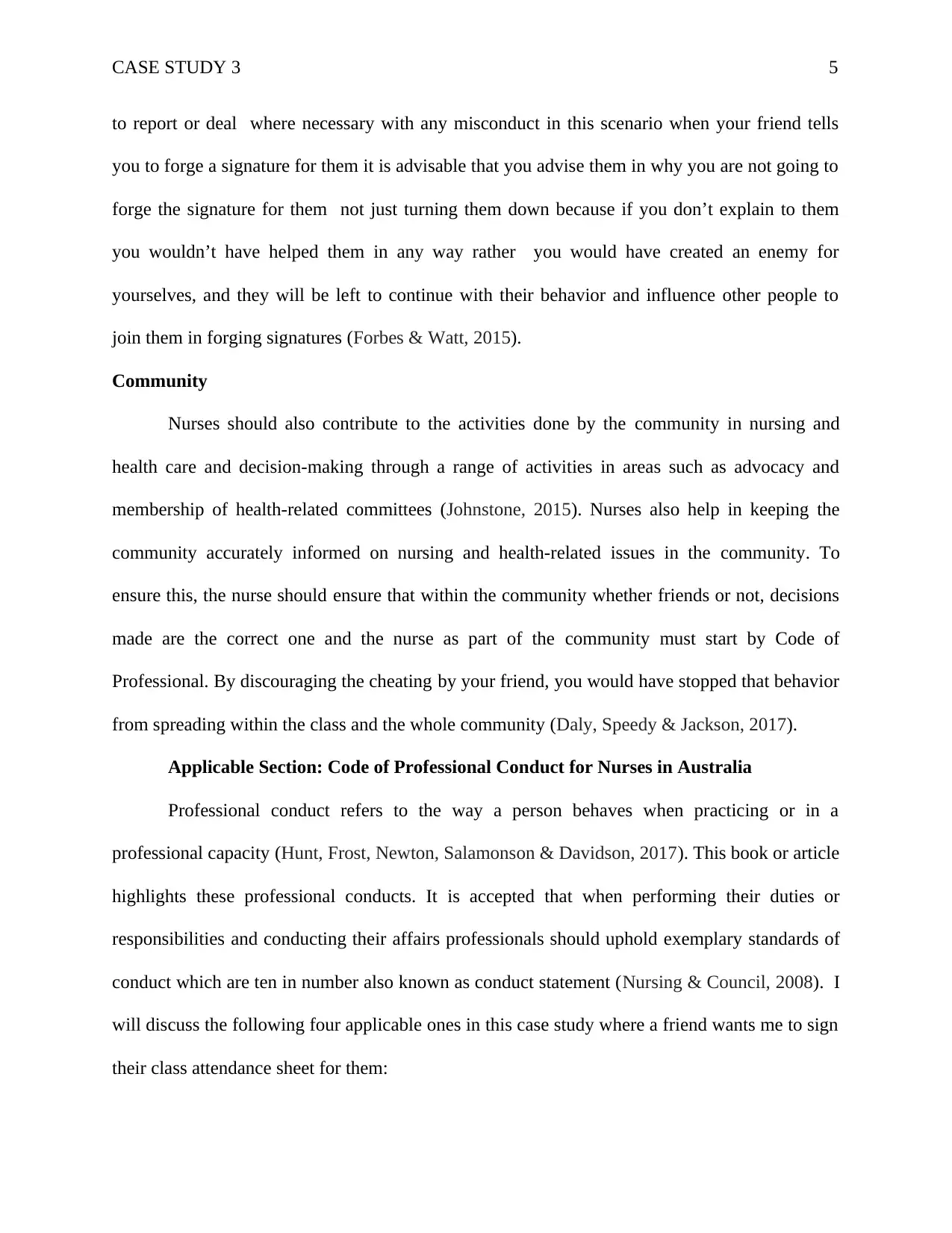
CASE STUDY 3 5
to report or deal where necessary with any misconduct in this scenario when your friend tells
you to forge a signature for them it is advisable that you advise them in why you are not going to
forge the signature for them not just turning them down because if you don’t explain to them
you wouldn’t have helped them in any way rather you would have created an enemy for
yourselves, and they will be left to continue with their behavior and influence other people to
join them in forging signatures (Forbes & Watt, 2015).
Community
Nurses should also contribute to the activities done by the community in nursing and
health care and decision-making through a range of activities in areas such as advocacy and
membership of health-related committees (Johnstone, 2015). Nurses also help in keeping the
community accurately informed on nursing and health-related issues in the community. To
ensure this, the nurse should ensure that within the community whether friends or not, decisions
made are the correct one and the nurse as part of the community must start by Code of
Professional. By discouraging the cheating by your friend, you would have stopped that behavior
from spreading within the class and the whole community (Daly, Speedy & Jackson, 2017).
Applicable Section: Code of Professional Conduct for Nurses in Australia
Professional conduct refers to the way a person behaves when practicing or in a
professional capacity (Hunt, Frost, Newton, Salamonson & Davidson, 2017). This book or article
highlights these professional conducts. It is accepted that when performing their duties or
responsibilities and conducting their affairs professionals should uphold exemplary standards of
conduct which are ten in number also known as conduct statement (Nursing & Council, 2008). I
will discuss the following four applicable ones in this case study where a friend wants me to sign
their class attendance sheet for them:
to report or deal where necessary with any misconduct in this scenario when your friend tells
you to forge a signature for them it is advisable that you advise them in why you are not going to
forge the signature for them not just turning them down because if you don’t explain to them
you wouldn’t have helped them in any way rather you would have created an enemy for
yourselves, and they will be left to continue with their behavior and influence other people to
join them in forging signatures (Forbes & Watt, 2015).
Community
Nurses should also contribute to the activities done by the community in nursing and
health care and decision-making through a range of activities in areas such as advocacy and
membership of health-related committees (Johnstone, 2015). Nurses also help in keeping the
community accurately informed on nursing and health-related issues in the community. To
ensure this, the nurse should ensure that within the community whether friends or not, decisions
made are the correct one and the nurse as part of the community must start by Code of
Professional. By discouraging the cheating by your friend, you would have stopped that behavior
from spreading within the class and the whole community (Daly, Speedy & Jackson, 2017).
Applicable Section: Code of Professional Conduct for Nurses in Australia
Professional conduct refers to the way a person behaves when practicing or in a
professional capacity (Hunt, Frost, Newton, Salamonson & Davidson, 2017). This book or article
highlights these professional conducts. It is accepted that when performing their duties or
responsibilities and conducting their affairs professionals should uphold exemplary standards of
conduct which are ten in number also known as conduct statement (Nursing & Council, 2008). I
will discuss the following four applicable ones in this case study where a friend wants me to sign
their class attendance sheet for them:
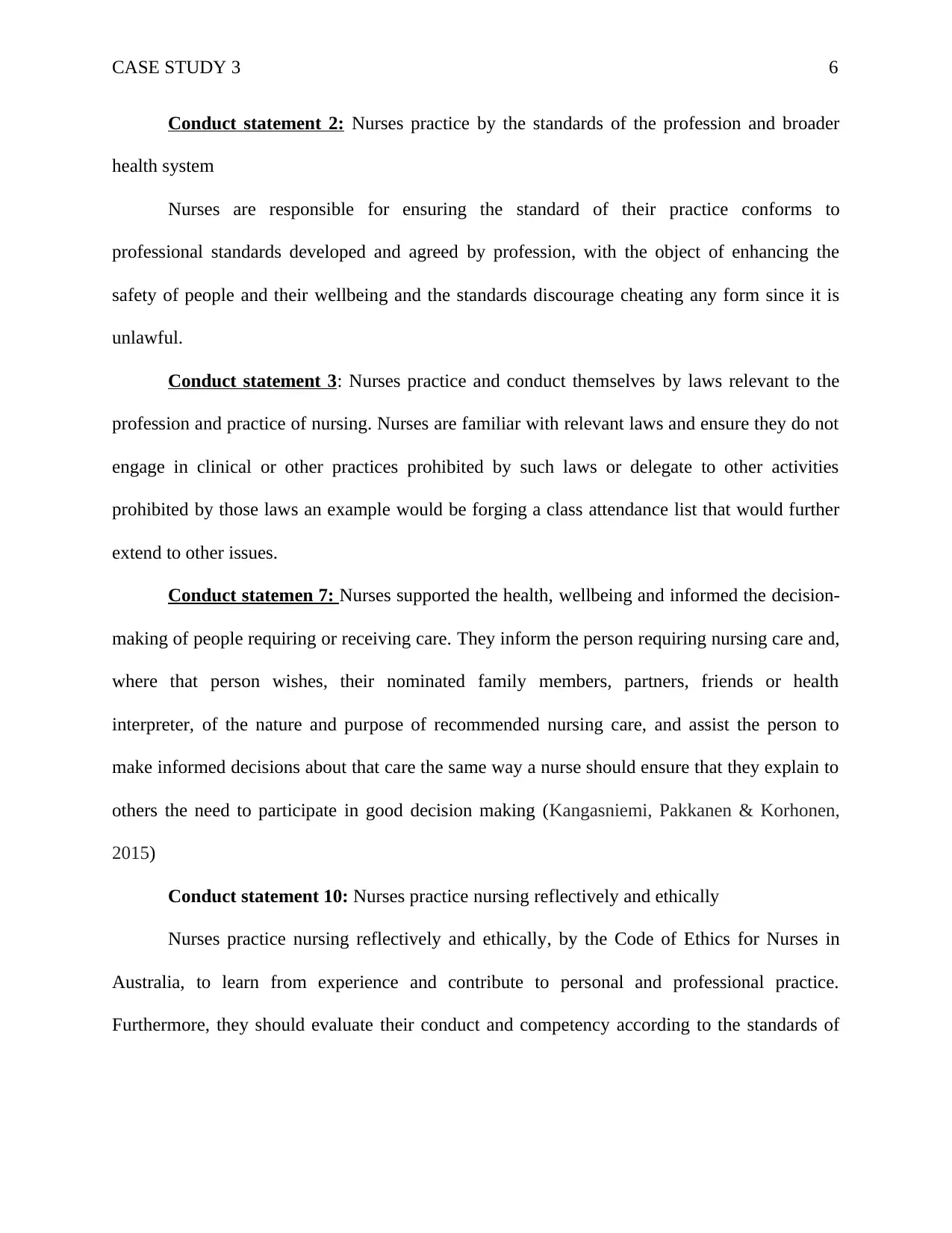
CASE STUDY 3 6
Conduct statement 2: Nurses practice by the standards of the profession and broader
health system
Nurses are responsible for ensuring the standard of their practice conforms to
professional standards developed and agreed by profession, with the object of enhancing the
safety of people and their wellbeing and the standards discourage cheating any form since it is
unlawful.
Conduct statement 3: Nurses practice and conduct themselves by laws relevant to the
profession and practice of nursing. Nurses are familiar with relevant laws and ensure they do not
engage in clinical or other practices prohibited by such laws or delegate to other activities
prohibited by those laws an example would be forging a class attendance list that would further
extend to other issues.
Conduct statemen 7: Nurses supported the health, wellbeing and informed the decision-
making of people requiring or receiving care. They inform the person requiring nursing care and,
where that person wishes, their nominated family members, partners, friends or health
interpreter, of the nature and purpose of recommended nursing care, and assist the person to
make informed decisions about that care the same way a nurse should ensure that they explain to
others the need to participate in good decision making (Kangasniemi, Pakkanen & Korhonen,
2015)
Conduct statement 10: Nurses practice nursing reflectively and ethically
Nurses practice nursing reflectively and ethically, by the Code of Ethics for Nurses in
Australia, to learn from experience and contribute to personal and professional practice.
Furthermore, they should evaluate their conduct and competency according to the standards of
Conduct statement 2: Nurses practice by the standards of the profession and broader
health system
Nurses are responsible for ensuring the standard of their practice conforms to
professional standards developed and agreed by profession, with the object of enhancing the
safety of people and their wellbeing and the standards discourage cheating any form since it is
unlawful.
Conduct statement 3: Nurses practice and conduct themselves by laws relevant to the
profession and practice of nursing. Nurses are familiar with relevant laws and ensure they do not
engage in clinical or other practices prohibited by such laws or delegate to other activities
prohibited by those laws an example would be forging a class attendance list that would further
extend to other issues.
Conduct statemen 7: Nurses supported the health, wellbeing and informed the decision-
making of people requiring or receiving care. They inform the person requiring nursing care and,
where that person wishes, their nominated family members, partners, friends or health
interpreter, of the nature and purpose of recommended nursing care, and assist the person to
make informed decisions about that care the same way a nurse should ensure that they explain to
others the need to participate in good decision making (Kangasniemi, Pakkanen & Korhonen,
2015)
Conduct statement 10: Nurses practice nursing reflectively and ethically
Nurses practice nursing reflectively and ethically, by the Code of Ethics for Nurses in
Australia, to learn from experience and contribute to personal and professional practice.
Furthermore, they should evaluate their conduct and competency according to the standards of
⊘ This is a preview!⊘
Do you want full access?
Subscribe today to unlock all pages.

Trusted by 1+ million students worldwide
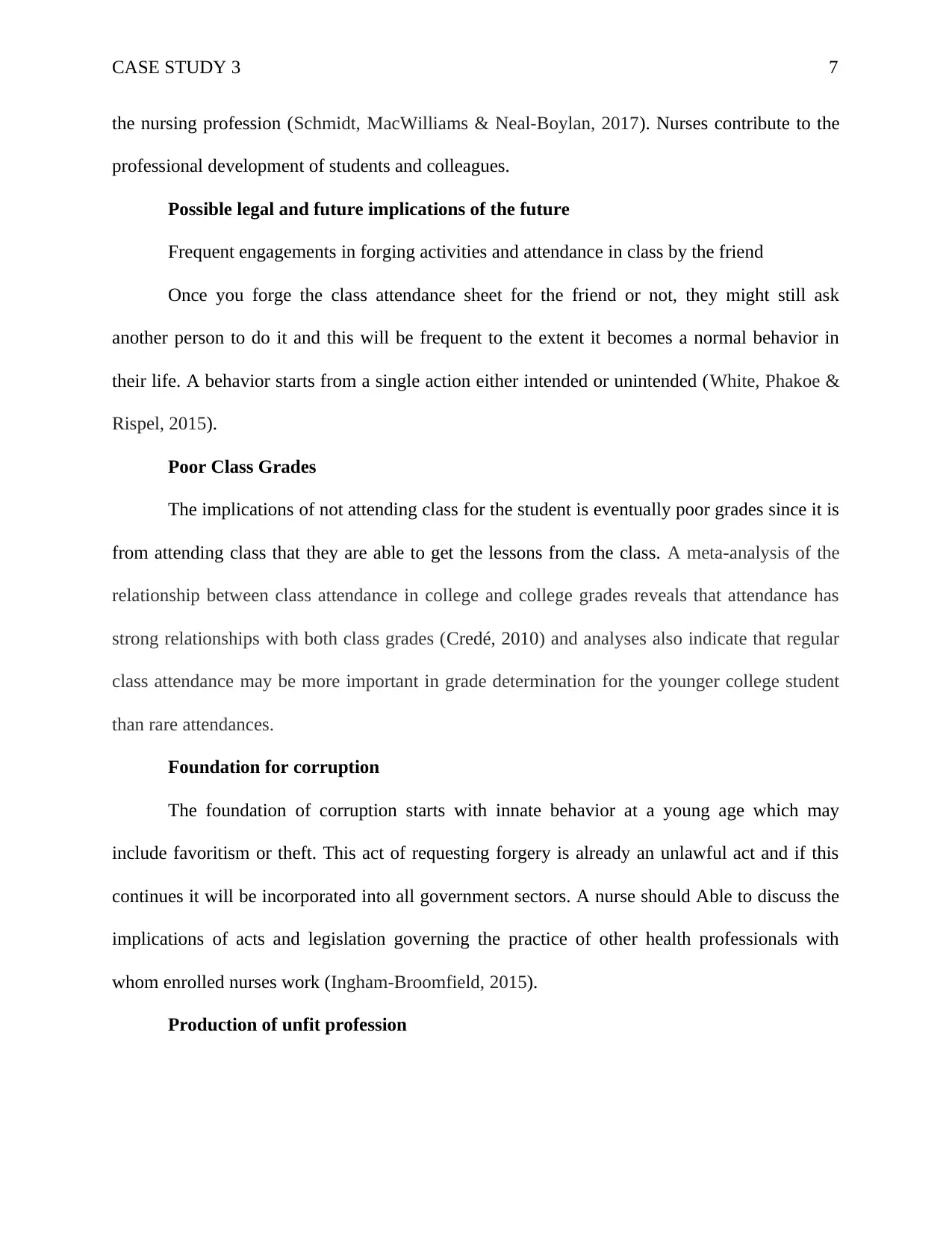
CASE STUDY 3 7
the nursing profession (Schmidt, MacWilliams & Neal-Boylan, 2017). Nurses contribute to the
professional development of students and colleagues.
Possible legal and future implications of the future
Frequent engagements in forging activities and attendance in class by the friend
Once you forge the class attendance sheet for the friend or not, they might still ask
another person to do it and this will be frequent to the extent it becomes a normal behavior in
their life. A behavior starts from a single action either intended or unintended (White, Phakoe &
Rispel, 2015).
Poor Class Grades
The implications of not attending class for the student is eventually poor grades since it is
from attending class that they are able to get the lessons from the class. A meta-analysis of the
relationship between class attendance in college and college grades reveals that attendance has
strong relationships with both class grades (Credé, 2010) and analyses also indicate that regular
class attendance may be more important in grade determination for the younger college student
than rare attendances.
Foundation for corruption
The foundation of corruption starts with innate behavior at a young age which may
include favoritism or theft. This act of requesting forgery is already an unlawful act and if this
continues it will be incorporated into all government sectors. A nurse should Able to discuss the
implications of acts and legislation governing the practice of other health professionals with
whom enrolled nurses work (Ingham-Broomfield, 2015).
Production of unfit profession
the nursing profession (Schmidt, MacWilliams & Neal-Boylan, 2017). Nurses contribute to the
professional development of students and colleagues.
Possible legal and future implications of the future
Frequent engagements in forging activities and attendance in class by the friend
Once you forge the class attendance sheet for the friend or not, they might still ask
another person to do it and this will be frequent to the extent it becomes a normal behavior in
their life. A behavior starts from a single action either intended or unintended (White, Phakoe &
Rispel, 2015).
Poor Class Grades
The implications of not attending class for the student is eventually poor grades since it is
from attending class that they are able to get the lessons from the class. A meta-analysis of the
relationship between class attendance in college and college grades reveals that attendance has
strong relationships with both class grades (Credé, 2010) and analyses also indicate that regular
class attendance may be more important in grade determination for the younger college student
than rare attendances.
Foundation for corruption
The foundation of corruption starts with innate behavior at a young age which may
include favoritism or theft. This act of requesting forgery is already an unlawful act and if this
continues it will be incorporated into all government sectors. A nurse should Able to discuss the
implications of acts and legislation governing the practice of other health professionals with
whom enrolled nurses work (Ingham-Broomfield, 2015).
Production of unfit profession
Paraphrase This Document
Need a fresh take? Get an instant paraphrase of this document with our AI Paraphraser
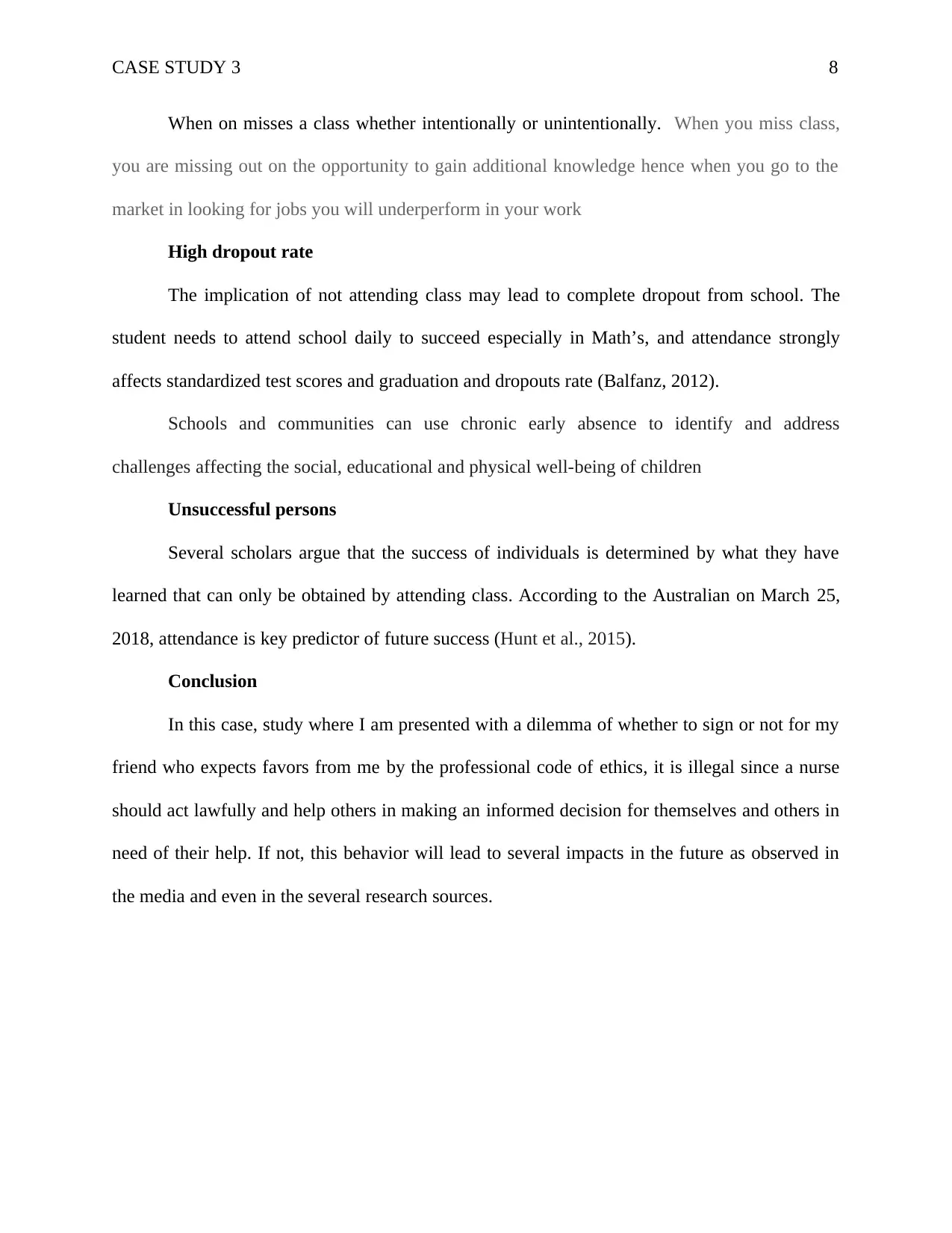
CASE STUDY 3 8
When on misses a class whether intentionally or unintentionally. When you miss class,
you are missing out on the opportunity to gain additional knowledge hence when you go to the
market in looking for jobs you will underperform in your work
High dropout rate
The implication of not attending class may lead to complete dropout from school. The
student needs to attend school daily to succeed especially in Math’s, and attendance strongly
affects standardized test scores and graduation and dropouts rate (Balfanz, 2012).
Schools and communities can use chronic early absence to identify and address
challenges affecting the social, educational and physical well-being of children
Unsuccessful persons
Several scholars argue that the success of individuals is determined by what they have
learned that can only be obtained by attending class. According to the Australian on March 25,
2018, attendance is key predictor of future success (Hunt et al., 2015).
Conclusion
In this case, study where I am presented with a dilemma of whether to sign or not for my
friend who expects favors from me by the professional code of ethics, it is illegal since a nurse
should act lawfully and help others in making an informed decision for themselves and others in
need of their help. If not, this behavior will lead to several impacts in the future as observed in
the media and even in the several research sources.
When on misses a class whether intentionally or unintentionally. When you miss class,
you are missing out on the opportunity to gain additional knowledge hence when you go to the
market in looking for jobs you will underperform in your work
High dropout rate
The implication of not attending class may lead to complete dropout from school. The
student needs to attend school daily to succeed especially in Math’s, and attendance strongly
affects standardized test scores and graduation and dropouts rate (Balfanz, 2012).
Schools and communities can use chronic early absence to identify and address
challenges affecting the social, educational and physical well-being of children
Unsuccessful persons
Several scholars argue that the success of individuals is determined by what they have
learned that can only be obtained by attending class. According to the Australian on March 25,
2018, attendance is key predictor of future success (Hunt et al., 2015).
Conclusion
In this case, study where I am presented with a dilemma of whether to sign or not for my
friend who expects favors from me by the professional code of ethics, it is illegal since a nurse
should act lawfully and help others in making an informed decision for themselves and others in
need of their help. If not, this behavior will lead to several impacts in the future as observed in
the media and even in the several research sources.
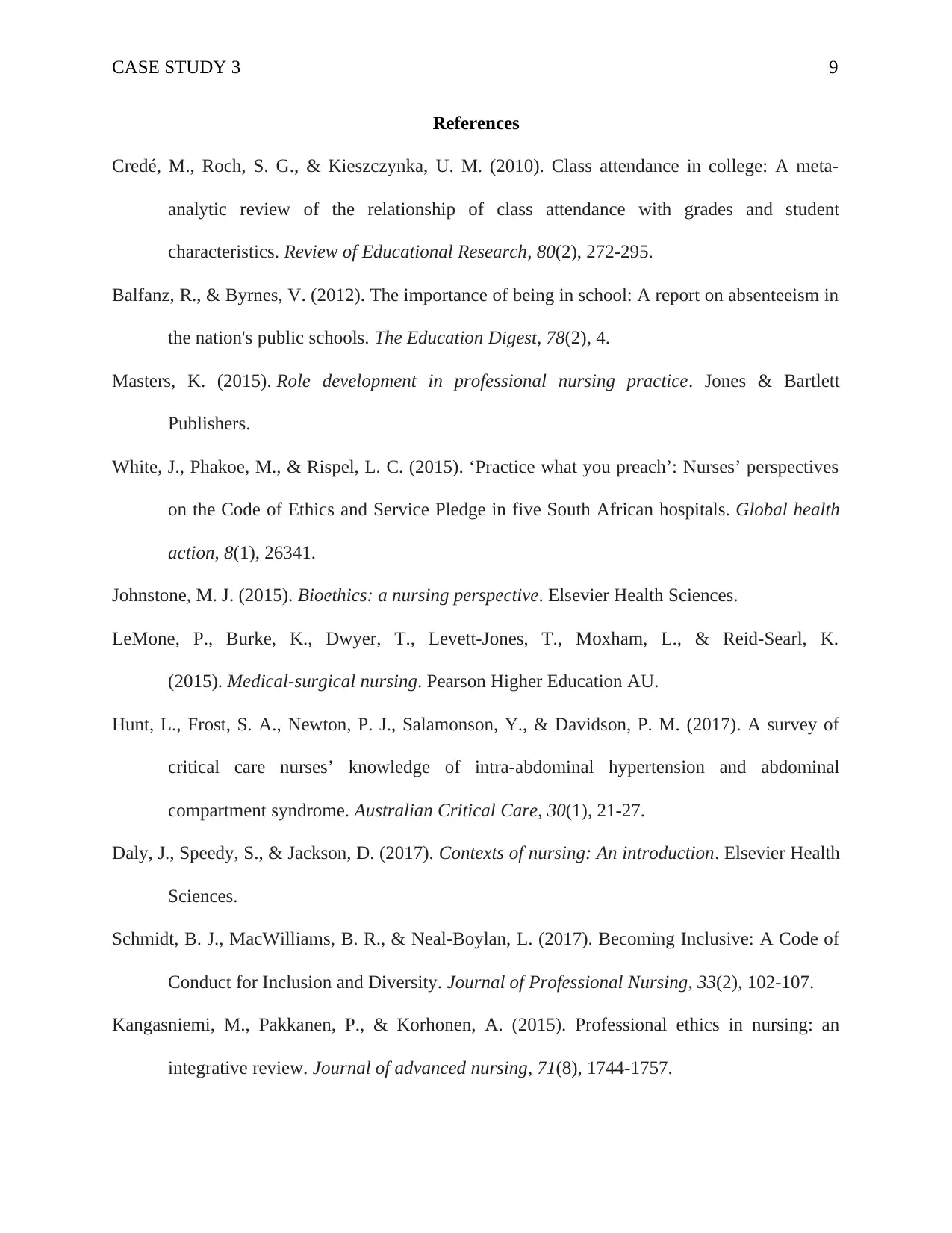
CASE STUDY 3 9
References
Credé, M., Roch, S. G., & Kieszczynka, U. M. (2010). Class attendance in college: A meta-
analytic review of the relationship of class attendance with grades and student
characteristics. Review of Educational Research, 80(2), 272-295.
Balfanz, R., & Byrnes, V. (2012). The importance of being in school: A report on absenteeism in
the nation's public schools. The Education Digest, 78(2), 4.
Masters, K. (2015). Role development in professional nursing practice. Jones & Bartlett
Publishers.
White, J., Phakoe, M., & Rispel, L. C. (2015). ‘Practice what you preach’: Nurses’ perspectives
on the Code of Ethics and Service Pledge in five South African hospitals. Global health
action, 8(1), 26341.
Johnstone, M. J. (2015). Bioethics: a nursing perspective. Elsevier Health Sciences.
LeMone, P., Burke, K., Dwyer, T., Levett-Jones, T., Moxham, L., & Reid-Searl, K.
(2015). Medical-surgical nursing. Pearson Higher Education AU.
Hunt, L., Frost, S. A., Newton, P. J., Salamonson, Y., & Davidson, P. M. (2017). A survey of
critical care nurses’ knowledge of intra-abdominal hypertension and abdominal
compartment syndrome. Australian Critical Care, 30(1), 21-27.
Daly, J., Speedy, S., & Jackson, D. (2017). Contexts of nursing: An introduction. Elsevier Health
Sciences.
Schmidt, B. J., MacWilliams, B. R., & Neal-Boylan, L. (2017). Becoming Inclusive: A Code of
Conduct for Inclusion and Diversity. Journal of Professional Nursing, 33(2), 102-107.
Kangasniemi, M., Pakkanen, P., & Korhonen, A. (2015). Professional ethics in nursing: an
integrative review. Journal of advanced nursing, 71(8), 1744-1757.
References
Credé, M., Roch, S. G., & Kieszczynka, U. M. (2010). Class attendance in college: A meta-
analytic review of the relationship of class attendance with grades and student
characteristics. Review of Educational Research, 80(2), 272-295.
Balfanz, R., & Byrnes, V. (2012). The importance of being in school: A report on absenteeism in
the nation's public schools. The Education Digest, 78(2), 4.
Masters, K. (2015). Role development in professional nursing practice. Jones & Bartlett
Publishers.
White, J., Phakoe, M., & Rispel, L. C. (2015). ‘Practice what you preach’: Nurses’ perspectives
on the Code of Ethics and Service Pledge in five South African hospitals. Global health
action, 8(1), 26341.
Johnstone, M. J. (2015). Bioethics: a nursing perspective. Elsevier Health Sciences.
LeMone, P., Burke, K., Dwyer, T., Levett-Jones, T., Moxham, L., & Reid-Searl, K.
(2015). Medical-surgical nursing. Pearson Higher Education AU.
Hunt, L., Frost, S. A., Newton, P. J., Salamonson, Y., & Davidson, P. M. (2017). A survey of
critical care nurses’ knowledge of intra-abdominal hypertension and abdominal
compartment syndrome. Australian Critical Care, 30(1), 21-27.
Daly, J., Speedy, S., & Jackson, D. (2017). Contexts of nursing: An introduction. Elsevier Health
Sciences.
Schmidt, B. J., MacWilliams, B. R., & Neal-Boylan, L. (2017). Becoming Inclusive: A Code of
Conduct for Inclusion and Diversity. Journal of Professional Nursing, 33(2), 102-107.
Kangasniemi, M., Pakkanen, P., & Korhonen, A. (2015). Professional ethics in nursing: an
integrative review. Journal of advanced nursing, 71(8), 1744-1757.
⊘ This is a preview!⊘
Do you want full access?
Subscribe today to unlock all pages.

Trusted by 1+ million students worldwide
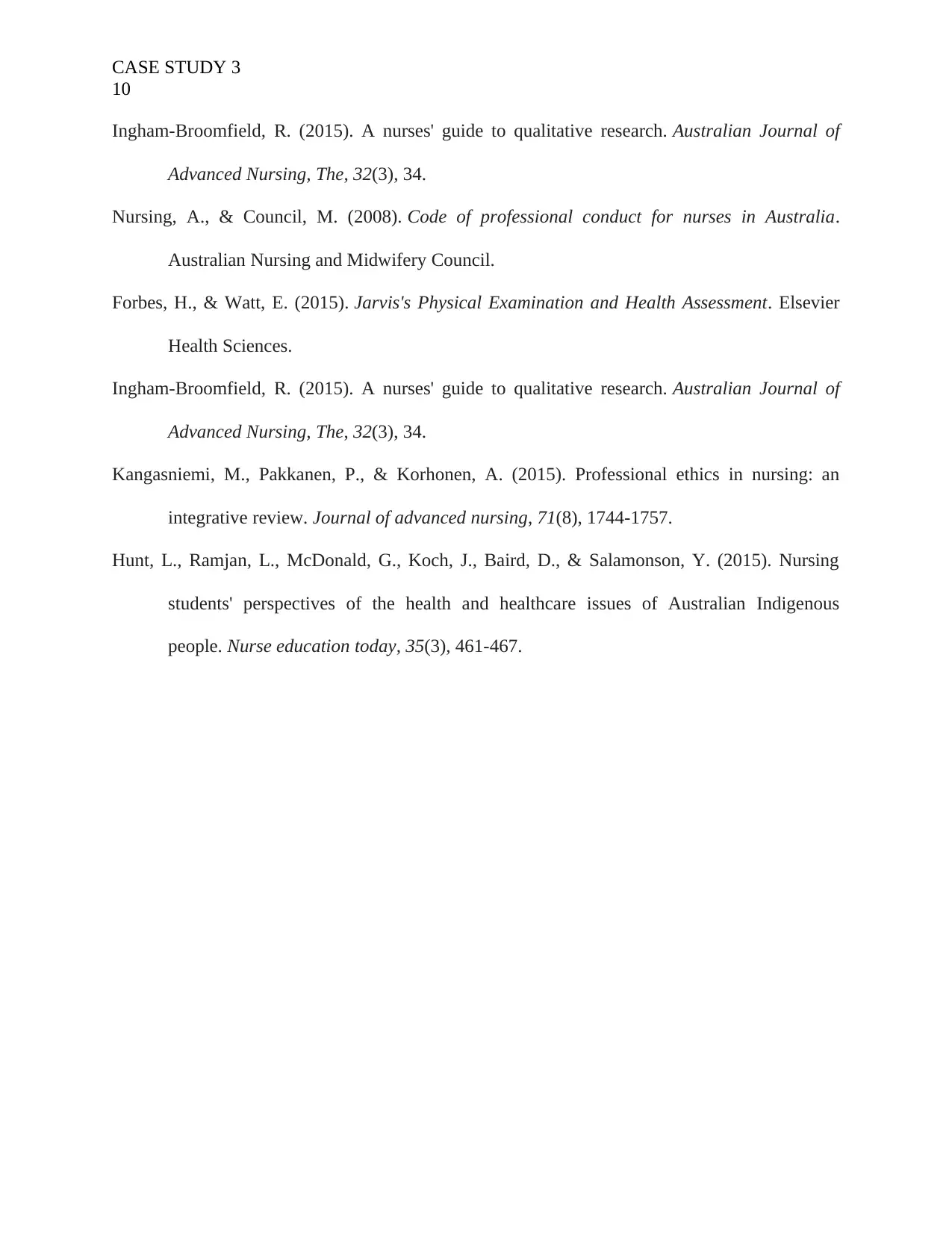
CASE STUDY 3
10
Ingham-Broomfield, R. (2015). A nurses' guide to qualitative research. Australian Journal of
Advanced Nursing, The, 32(3), 34.
Nursing, A., & Council, M. (2008). Code of professional conduct for nurses in Australia.
Australian Nursing and Midwifery Council.
Forbes, H., & Watt, E. (2015). Jarvis's Physical Examination and Health Assessment. Elsevier
Health Sciences.
Ingham-Broomfield, R. (2015). A nurses' guide to qualitative research. Australian Journal of
Advanced Nursing, The, 32(3), 34.
Kangasniemi, M., Pakkanen, P., & Korhonen, A. (2015). Professional ethics in nursing: an
integrative review. Journal of advanced nursing, 71(8), 1744-1757.
Hunt, L., Ramjan, L., McDonald, G., Koch, J., Baird, D., & Salamonson, Y. (2015). Nursing
students' perspectives of the health and healthcare issues of Australian Indigenous
people. Nurse education today, 35(3), 461-467.
10
Ingham-Broomfield, R. (2015). A nurses' guide to qualitative research. Australian Journal of
Advanced Nursing, The, 32(3), 34.
Nursing, A., & Council, M. (2008). Code of professional conduct for nurses in Australia.
Australian Nursing and Midwifery Council.
Forbes, H., & Watt, E. (2015). Jarvis's Physical Examination and Health Assessment. Elsevier
Health Sciences.
Ingham-Broomfield, R. (2015). A nurses' guide to qualitative research. Australian Journal of
Advanced Nursing, The, 32(3), 34.
Kangasniemi, M., Pakkanen, P., & Korhonen, A. (2015). Professional ethics in nursing: an
integrative review. Journal of advanced nursing, 71(8), 1744-1757.
Hunt, L., Ramjan, L., McDonald, G., Koch, J., Baird, D., & Salamonson, Y. (2015). Nursing
students' perspectives of the health and healthcare issues of Australian Indigenous
people. Nurse education today, 35(3), 461-467.
1 out of 10
Related Documents
Your All-in-One AI-Powered Toolkit for Academic Success.
+13062052269
info@desklib.com
Available 24*7 on WhatsApp / Email
![[object Object]](/_next/static/media/star-bottom.7253800d.svg)
Unlock your academic potential
Copyright © 2020–2025 A2Z Services. All Rights Reserved. Developed and managed by ZUCOL.





